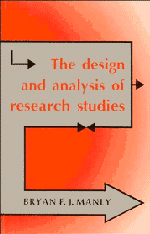Book contents
- Frontmatter
- Contents
- Preface
- 1 Preview
- 2 The sample survey
- 3 Other sampling designs
- 4 The linear regression model
- 5 Experimental designs to assess the effect of a treatment
- 6 Interrupted time series
- 7 More advanced experimental designs
- 8 Some special types of data
- 9 Computer intensive statistics
- 10 Ethical considerations
- 11 Synthesis: carrying out a research study
- References
- Author index
- Subject index
2 - The sample survey
Published online by Cambridge University Press: 05 February 2015
- Frontmatter
- Contents
- Preface
- 1 Preview
- 2 The sample survey
- 3 Other sampling designs
- 4 The linear regression model
- 5 Experimental designs to assess the effect of a treatment
- 6 Interrupted time series
- 7 More advanced experimental designs
- 8 Some special types of data
- 9 Computer intensive statistics
- 10 Ethical considerations
- 11 Synthesis: carrying out a research study
- References
- Author index
- Subject index
Summary
Introduction
A sample survey involves estimating some parameters of a population using a sample of items from the population. There are therefore three key elements in a sample survey: the population being sampled, the sampling scheme and the parameters being estimated.
The population is the collection of all the items that are of interest. For example, this might be all the hospitals in a country, all the patients with a disease now and in the future, all the wild cats in an area, or all the invoices processed by a company in a one-year period. Some populations, such as the hospitals in a country, are of a finite size that can be determined if necessary. Others, such as all the patients with a disease now and in the future are finite, but with an indeterminate size. In some cases a population is infinite, an example being the results that can be obtained by repeatedly tossing a coin and seeing whether the result is heads or tails (assuming that the coin does not wear out).
A simple random sample is one that is drawn from a population in such a way that all items are given the same chance of selection. This can be with replacement (so that an item can be included more than once) or without replacement (so that repeats are not allowed). For finite populations, sampling without replacement is preferable, since this gives slightly better accuracy than sampling with replacement. Therefore, for the remainder of this chapter sampling without replacement can be assumed unless something is said to the contrary.
- Type
- Chapter
- Information
- The Design and Analysis of Research Studies , pp. 17 - 57Publisher: Cambridge University PressPrint publication year: 1992



